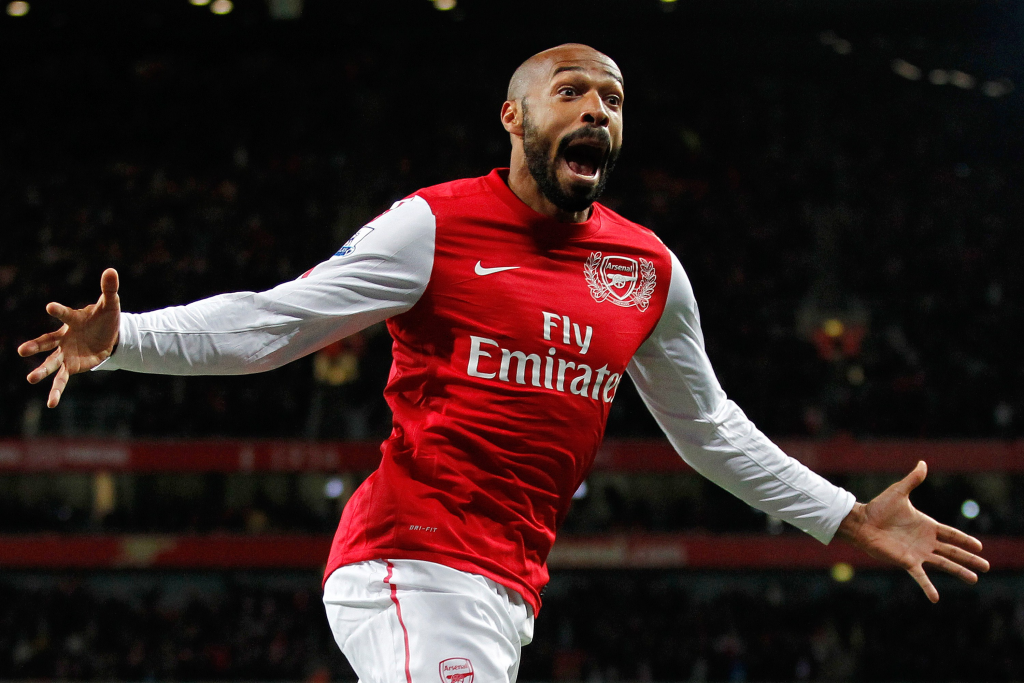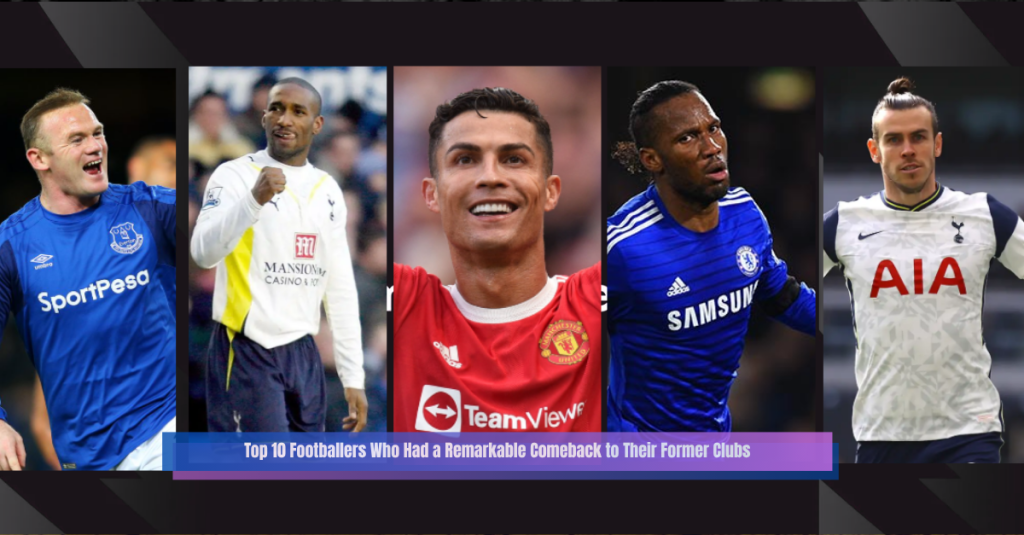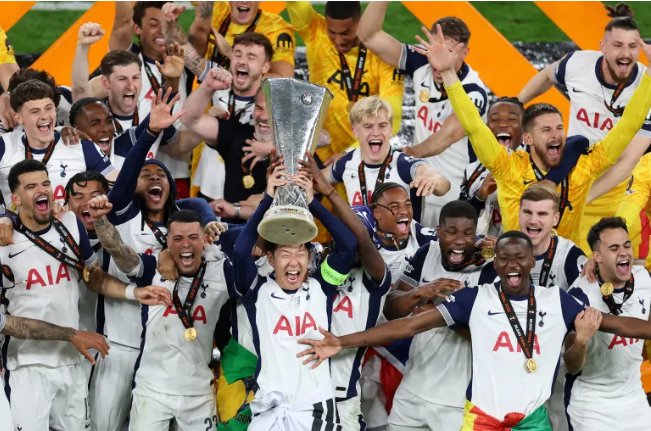Football fans love a remarkable comeback—when a beloved star returns to a former team and reignites emotions, memories, and performances. Ilkay Gündoğan recently showed this by rejoining Manchester City just a year after leaving for Barcelona. This move reminds us that second spells can be as impactful—or even more so—than first stints. Writer Adrian Kajumba’s list of ten players who returned to Premier League clubs for a second spell inspired this ranking of iconic footballers who made truly remarkable comebacks.
Each of the following players returned to their former teams and delivered memorable performances, titles, or moments that cemented their legacy. Their stories show the emotional resonance of going back to familiar surroundings, fans, and significance. Let’s count down from 10 to 1 the most remarkable comeback moments in modern football.
10. Gareth Bale

Gareth Bale’s return to Tottenham in 2020 was a remarkable comeback full of emotion and nostalgia. Initially arriving from Southampton in 2007, Bale transformed into a global superstar with 146 appearances and 42 goals over six seasons. His move to Real Madrid followed, where he achieved immense success. In 2020, Spurs welcomed him back on loan; despite struggles in form and fitness, Bale managed 11 goals in 20 appearances across all competitions.
Even at age 31, his pace and moments of brilliance—such as a Premier League hat-trick against Sheffield United—reminded fans why his initial spell was unforgettable. While not reaching the heights of his prime, his return stirred the Spurs faithful and added star power to the squad. Though Tottenham’s season was turbulent, Bale’s second stint offered glimpses of greatness and served as a remarkable comeback story of a homecoming filled with emotion rather than silverware or sustained performance.
9. Didier Drogba

Didier Drogba’s return to Chelsea in 2014 was a bona fide remarkable comeback. After initially leaving Stamford Bridge as a legend, having scored 100 goals in 226 appearances and lifted multiple trophies, Drogba rejoined under manager José Mourinho. Though older and less prolific, he still contributed four important league goals in 28 appearances in his return spell.
His second stint culminated in another Premier League title before he retired at the club he helped elevate. Fans celebrated his final match as a send-off worthy of a club icon. Drogba’s comeback reinforced that impact is not only measured in goals but in legacy and emotional resonance, making his return a standout example of football’s most lasting hero stories.
8. Jermain Defoe

Jermain Defoe returned to Tottenham in 2009 after a season at Portsmouth and immediately reached new heights. His remarkable comeback saw him net 48 goals in 137 appearances from 2009 to 2014, eclipsing the 43 goals he scored in his first spell. Always lethal in the penalty box, he became a reliable source of goals across Premier League, Europe, and Cup competitions.
Defoe’s return coincided with Spurs re-emerging as consistent European contenders. His clinical finishing, professionalism, and longevity made his second spell arguably more productive, cementing his legacy as a Tottenham legend. Defoe’s return exemplifies a remarkable comeback grounded in consistency and continued output at the highest level.
7. Cristiano Ronaldo

Cristiano Ronaldo’s return to Manchester United in 2021 was one of the most high-profile remarkable comebacks in recent years. Originally bound for glory after scoring 84 goals in 196 Premier League games in his first spell (2003–09), Ronaldo returned as a global icon. In his second stint he scored 19 goals in 40 Premier League appearances despite a season of instability at Old Trafford.
Though trophies didn’t follow, his comeback generated enormous excitement and media attention. Ronaldo’s return demonstrated both the enduring bond with his first club and the emotional weight a remarkable comeback can carry—even without silverware. His return was a cultural moment as much as a sporting one.
Also Read: Top 10 legendary German Footballers of All Time
6. Wayne Rooney

Wayne Rooney began and ended his Premier League journey at Everton. After becoming a star at United, Rooney returned to Everton in 2017, scoring 10 goals in 31 appearances before moving on. While not as prolific as his first spell at Everton, this move was emotionally charged—a return to his boyhood club to finish his career.
One highlight: a stunning goal from inside his own half, and his first hat-trick for the Toffees. Rooney’s return epitomized a remarkable comeback fueled by loyalty and sentiment rather than statistical success. Fans welcomed him back as one of their own, closing the loop on a career entwined with Everton identity.
5. Juninho

Juninho’s three spells at Middlesbrough truly define a remarkable comeback saga. He first joined from Brazil (1995–97), notching 12 goals in 57 matches before leaving. He returned via loan (1999–2000) and again later (2002–04), scoring a total of 15 goals across both spells. His final return helped Middlesbrough win the 2004 League Cup—their only major honour.
His style of play, joyous attitude, and connection with fans made Juninho one of the club’s all-time favourites. Returning twice more than most players, Juninho’s multiple comebacks created a narrative of devotion, consistency, and legacy which stood out as a remarkable comeback journey full of legacy and loyalty.
4. Jürgen Klinsmann

Jürgen Klinsmann rejoined Tottenham in 1997 after a successful first season (41 apps, 20 goals). His remarkable comeback lasted one season but made a huge impact: he scored nine goals in 16 matches, including a four-goal haul at Wimbledon and vital goals to secure Tottenham’s Premier League survival in 1997–98.
His return spell came at a time when Spurs needed experience and firepower. While short, it was effective, impactful, and critical for the club’s continuity. Klinsmann’s comeback stands as a remarkable chapter defined by clutch moments and leadership under pressure.
3. Robbie Fowler

Robbie Fowler returned to Liverpool in 2006 on a free transfer after spells elsewhere. Known for 120 goals in 236 matches from 1993–2001, Fowler added another eight in 30 appearances. Although past his prime, his return was a remarkable comeback that reignited fan affection and delivered key goals in a difficult season.
Fowler’s reappearance marked the end of a chapter and a nod to fan connection—Liverpool supporters celebrated his return with chants and emotion. His comeback reinforced that legacy extends beyond form; it lives in collective memory and sentiment.
2. Teddy Sheringham

Teddy Sheringham returned to Tottenham in 2001 aged 35 after stints at Manchester United. In his first spell (1992–97), he scored 75 goals in 166 appearances; in his second he added 22 goals in 70 games. Though nearing the end of his career, he was still a reliable and composed finisher in the box.
His return provided experience, leadership, and tactical intelligence in the Spurs midfield and forward line. Sheringham’s remarkable comeback blended professionalism with productivity, showing that even older players can return and contribute at a high level.
1. Thierry Henry

Thierry Henry tops the list for delivering the most remarkable comeback of all. Having starred for Arsenal from 1999 to 2007—scoring 174 goals in 254 Premier League matches and winning multiple titles—he returned on loan in 2012 from New York Red Bulls. In just four matches, he scored a goal in his debut and another winner in stoppage time of his final game.
These two goals were enough to set Emirates Stadium alight, giving fans magic one last time. Henry’s limited second spell became iconic: proof that even a brief return can yield lasting memories. His emotional reunion with Arsenal cemented his legend and remains a gold standard for a remarkable comeback.
| Rank | Player | Club | First Spell | Second Spell |
|---|---|---|---|---|
| 1 | Thierry Henry | Arsenal | 1999–2007: 254 apps, 174 goals | 2012 (loan): 4 apps, 1 goal |
| 2 | Teddy Sheringham | Tottenham Hotspur | 1992–97: 166 apps, 75 goals | 2001–03: 70 apps, 22 goals |
| 3 | Robbie Fowler | Liverpool | 1993–2001: 236 apps, 120 goals | 2006–07: 30 apps, 8 goals |
| 4 | Jürgen Klinsmann | Tottenham Hotspur | 1994–95: 41 apps, 20 goals | 1997–98: 16 apps, 9 goals |
| 5 | Juninho | Middlesbrough | 1995–97: 57 apps, 12 goals | Three spells totalling 69 apps, 15 goals |
| 6 | Wayne Rooney | Everton | 2002–04: 67 apps, 15 goals | 2017–18: 31 apps, 10 goals |
| 7 | Cristiano Ronaldo | Manchester United | 2003–09: 196 apps, 84 goals | 2021–22: 40 apps, 19 goals |
| 8 | Jermain Defoe | Tottenham Hotspur | 2004–08: 139 apps, 43 goals | 2009–14: 137 apps, 48 goals |
| 9 | Didier Drogba | Chelsea | 2004–12: 226 apps, 100 goals | 2014–15: 28 apps, 4 goals |
| 10 | Gareth Bale | Spurs | 2007–2013: 146 apps, 42 goals | 2020–21 (loan): 20 apps, 11 goals |
FAQs
What qualifies as a “remarkable comeback”?
A player returning to a former club and delivering performances, moments, or titles that reignite their legacy counts as a remarkable comeback.
Do comebacks guarantee success?
Not always—a player’s return may be short or underwhelming. The impact can be emotional, symbolic, or strategic rather than about trophies or consistent output.
Why return to a former club?
Many players return for emotional ties, unfinished business, or to help clubs in transition. Legacy, leadership, and fan connection often drive these comebacks.
Are second spells usually shorter?
Often yes; returns typically last one or two years and may be loan deals. However, even short spells can define a legacy depending on impact.
Who had the most productive return?
Thierry Henry’s brief but potent return and Defoe’s productive second spell make them standout cases.


